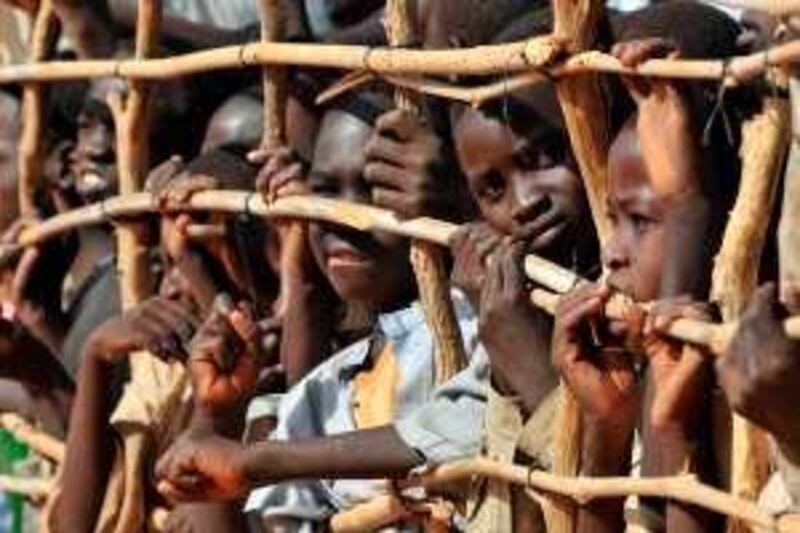KHARTOUM // Faced with immense international attention, the Sudanese government is pinning all its hopes on what it describes as a "final and comprehensive peace agreement for Darfur", expected to be reached at a conference in Doha next week. As the Sudanese government's chief negotiator, the outcome will in large part hinge on the efforts of Ameen Hassan Omer who, in an interview with The National at his office in Khartoum, said only an agreement with rebel groups will bring an end to the troubles in Darfur.
"Every observer of Sudan knows that everyone involved wants a formal end to things which are taking place in Darfur," he said. "The only formal end is to sign an agreement with the rebel movements." Mr Omer represents the government in negotiations with the rebels and is also the chairman of the delegation that will head to Doha for the talks on November 15. The government, he said, is confident of success at the conference.
A seasoned member of the ruling National Congress Party and the party's political strategist, Mr Omer insists that the war in Darfur is over but concedes that the humanitarian situation is "not normal". "I agree that efforts need to be taken in the area of security, especially in North Darfur, but we can't talk of a war, for sure," said Mr Omer. "However, we cannot talk about a normal humanitarian situation either when we have hundreds of thousand of internally displaced people living in camps.
"It is, in fact, the main problem. The whole exercise of reconciliation, negotiation and security is all to bring back IDPs back home." According to the UN, the Darfur war displaced an estimated 2.7 million people and killed more than 300,000. The war began in 2003 between Darfur rebel groups and government forces and allied Janjaweed militias. Many tribes throughout the region were dragged into the conflict over the years.
Last month, Barack Obama, the US president, released his country's much-awaited new policy on Sudan, which was surprisingly conciliatory, offering incentives to Khartoum if peace was achieved in Darfur and with southern Sudan, where a 25-year civil war left nearly two million dead according to the UN. While rights groups rejected the new policy, Khartoum has cautiously welcomed it. "It's a policy of engagement, not a policy of confrontation," said Mr Omer.
However, he criticised the way the US has referred to the situation as genocide. "This is just rubbish. Why should the US talk to perpetrators of genocide? Terming tribal conflicts in Darfur as genocide is just political hypocrisy," he said. The International Criminal Court in The Hague is seeking to prosecute Sudan's president Omar al Bashir for committing war crimes in Darfur, which he denies.
With the world watching, the Doha conference is being seen by Khartoum as its final push for peace in Darfur. Sudan has already called for international pressure to ensure that all parties involved in the Darfur situation come to the table for discussions. "If our international partners are able to bring the rebel movements to Doha then everything will head in [the] right direction," Mr Omer said.
Apart from the smaller tribal groups from Darfur, the government is hoping the most heavily armed, the Justice and Equality Movement (JEM), will come to the summit. Sudan accuses its neighbour Chad of backing the JEM in its struggle against the government. "Maybe we could convince JEM to come to Doha but I am not sure. The relations with JEM will always be affected by our relations with Chad," Mr Omer said.
"Our problem with the rebel movements is that we can't find a partner. We cannot find somebody who can sit on the other side of the table. "They are not able to come because most of them do not know what is the real cause of the war." Khartoum sees a solution to the conflict as crucial ahead of multi-party national elections next April, the first time in over two decades in Africa's largest nation by area.
Following the elections, the country plans to have a referendum in 2011 in which South Sudan would decide its independence from the dominant ruling North. A delegation of the UN refugee agency, UNHCR, along with representatives of donor nations visited Darfur last month to assess the current situation. "In Darfur, the UNHCR is working closely with the government to solve the security situation. It is difficult to work amid a continuing security threat," Peter de Clercq, the representative in Sudan for the UNHCR, told The National on the sidelines of a press conference in Khartoum.
"People are worried to return back to their homes and this situation has to change. "The situation in Darfur is still problematic but there is a ray of hope," he added. Darfur's humanitarian situation remains critical, with millions living in camps and refusing to return home, fearing violence. The government claims it will push its efforts this winter. "Now, autumn is behind us which is the most tough season in Darfur. The winter is good and we've to avail ourself of these months of winter and early summer to do something drastic for solving the problem of IDPs and refugees.
"If we sign a political agreement with movement in Doha it will send a signal that now there is no war." pmenon@thenational.ae





